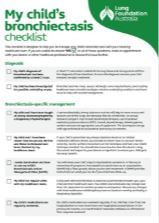The Paediatric Bronchiectasis Checklist from Lung Foundation Australia is a practical tool designed to help parents and caregivers manage bronchiectasis in children. This checklist covers key aspects of care, ensuring children receive appropriate treatment, regular monitoring, and lifestyle support to maintain their lung health. By following this structured guide, families can work with healthcare professionals to reduce symptoms, prevent complications, and improve quality of life.
The checklist begins with the importance of confirming a bronchiectasis diagnosis through a chest CT scan. Once diagnosed, healthcare providers should investigate potential underlying causes to tailor treatment effectively. Regular medical reviews with a respiratory specialist are essential to track symptoms, adjust medications, and assess sputum production.
One of the most important aspects of managing bronchiectasis is airway clearance. A respiratory physiotherapist should provide personalised techniques, such as breathing exercises, positive expiratory pressure devices, and manual physiotherapy. These techniques should be reviewed every six months to ensure they remain effective. Caregivers should also be trained in the correct use of inhaled medications and airway clearance devices.
The checklist highlights the need for a bronchiectasis action management plan. This plan helps families recognise and respond to worsening symptoms early, which can prevent severe flare-ups. Keeping up with vaccinations, including influenza, pneumococcal pneumonia, and COVID-19, is also essential to reduce the risk of infections that can worsen lung damage.
Other important factors in managing bronchiectasis include encouraging regular physical activity, which helps clear mucus and improves overall health, and ensuring a nutritious diet to support growth and immunity. Mental well-being is another consideration, as chronic illness can lead to stress or anxiety. Seeking emotional support for both children and caregivers is encouraged.
The checklist also reminds families to avoid smoke and e-cigarette exposure, as these can significantly worsen lung function. If quitting smoking or vaping is a challenge, support services are available.
Using the Paediatric Bronchiectasis Checklist ensures that families stay on top of their child’s treatment and care. It can be used during medical appointments to guide discussions with healthcare professionals and ensure nothing is overlooked. Taking proactive steps with the right knowledge and support can make a significant difference in improving a child’s lung health and overall well-being.
Was this page helpful?
Good job! Please give your positive feedback
How could we improve this post? Please Help us.




